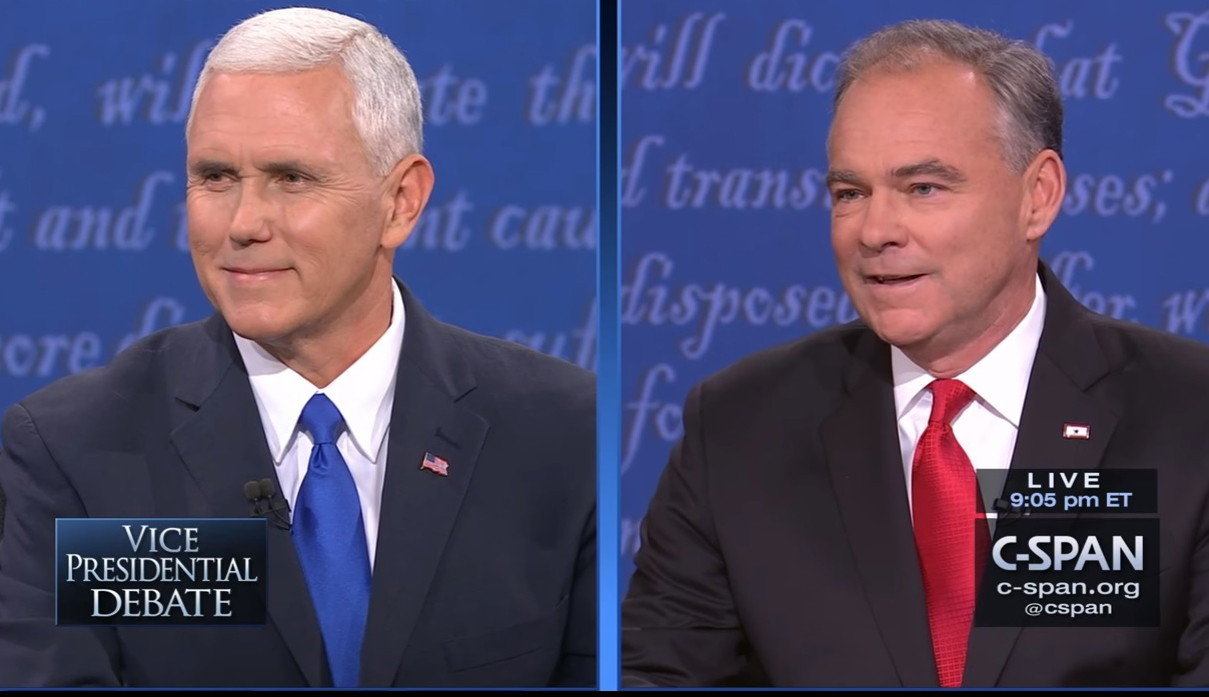
FARMVILLE, Va. (BP) — A nine-minute discussion of personal faith and social issues capped a vice presidential debate between Democrat Tim Kaine and Republican Mike Pence that also included discussion of racial bias in the criminal justice system, immigration and humanitarian aid in Syria.
 The 90-minute debate hosted by Virginia’s Longwood University Oct. 4 additionally featured squabbles about the character of presidential nominees Hillary Clinton and Donald Trump.
The 90-minute debate hosted by Virginia’s Longwood University Oct. 4 additionally featured squabbles about the character of presidential nominees Hillary Clinton and Donald Trump.
Kaine, Virginia’s junior U.S. senator, criticized Trump for not releasing his federal income tax returns and allegedly misusing funds donated to his family’s charitable foundation. Pence, the governor of Indiana, criticized Clinton for using a private email server as secretary of state and allegedly misusing her family’s charitable foundation.
When discussion turned to religion and social issues, both candidates professed deep personal faith but applied it to public policy in contrasting ways.
Kaine, a Roman Catholic who served as a missionary in Honduras 35 years ago, said he tries “to practice [his] religion in a very devout way.” He added, however, “You should live fully and with enthusiasm the commands of your faith. But it is not the role of the public servant to mandate that for everybody else.”
That principle should apply, Kaine said, in public policy related to capital punishment and abortion among other issues.
Noting he personally opposes the death penalty, Kaine said he allowed executions to proceed when he was governor of Virginia because “I told Virginia voters I would uphold the law.”
On abortion, Kaine — who has claimed personal opposition to the practice — said he and Clinton “support Roe v. Wade. We support the constitutional right of American women to consult their own conscience, their own supportive partner, their own minister, but then make their own decision about pregnancy. That’s something we trust American women to do.”
Pence, who was raised Roman Catholic, said the “Christian faith became real for me when I made a personal decision for Christ when I was a freshman in college. And I’ve tried to live that out however imperfectly every day of my life since.” Media reports indicate Pence has claimed both evangelical and Catholic religious identity during his political career.
Pence referenced Jeremiah 1:5 — in which God states, “Before I formed you in the womb I knew you” — as one basis for his belief in “the sanctity of human life.” He touted Indiana’s pro-adoption policies as well as his efforts “to make sure that we expand alternatives in health care counseling for women, non-abortion alternatives.”
Clinton’s support of partial-birth abortion drew criticism from Pence as did her expressed desire to repeal the Hyde Amendment, which Pence referenced as “the longstanding provision in the law where we said we wouldn’t use taxpayer dollars to fund abortions.”
“A society can be judged,” Pence said, “by how it deals with its most vulnerable: the aged, the infirm, the disabled and the unborn. I believe it with all my heart. And I couldn’t be more proud to be standing with a pro-life candidate in Donald Trump.”
The vice presidential candidates sparred over Trump’s statement in March that women who have abortions should face “some form of punishment.” Within hours of making the statement, Trump stated in a press release he would only punish health care providers who perform abortions, not women who have them.
Kaine said “the very last thing that government should do is have laws that would punish women who make reproductive choices. And that is the fundamental difference between a Clinton-Kaine ticket and a Trump-Pence ticket that wants to punish women who make that choice.”
Pence countered that “things don’t always come out exactly the way [Trump] means them” and assured voters “the policy of our administration” would be to “never support legislation that punished women who made the heartbreaking choice to end a pregnancy.”
Among other topics discussed:
— Both candidates spoke of racial bias in the criminal justice system and advocated criminal justice reform as well as community policing. Pence accused the Clinton campaign of wrongly using “a broad brush to accuse law enforcement of implicit bias or institutional racism.” Kaine seemed to suggest Pence was “afraid to bring up issues of bias in law enforcement.”
— On immigration, Pence called for focus on deporting “criminal aliens,” “extreme vetting for people coming into this country” and suspension of “the Syrian refugee program and … immigration from areas of the world that have been compromised by terrorism.”
Kaine criticized Trump’s December 2015 proposal of temporarily halting Muslim immigration, which he has since revised. “We should focus upon danger,” Kaine said, “not upon discrimination.” Kaine’s proposals included “keeping families together as the top goal” of immigration policy and providing “a path to citizenship” for immigrants “who work hard, pay taxes, play by the rules and take criminal background record checks.”
— Both candidates proposed establishing safe zones in northern Syria where families and other vulnerable residents of the war-torn nation could go for humanitarian aid.
The next debate of the campaign is a presidential debate featuring Clinton and Trump Oct. 9.













